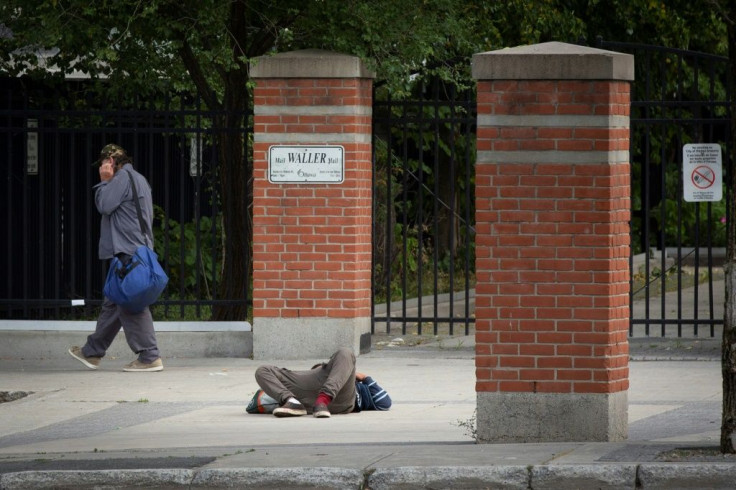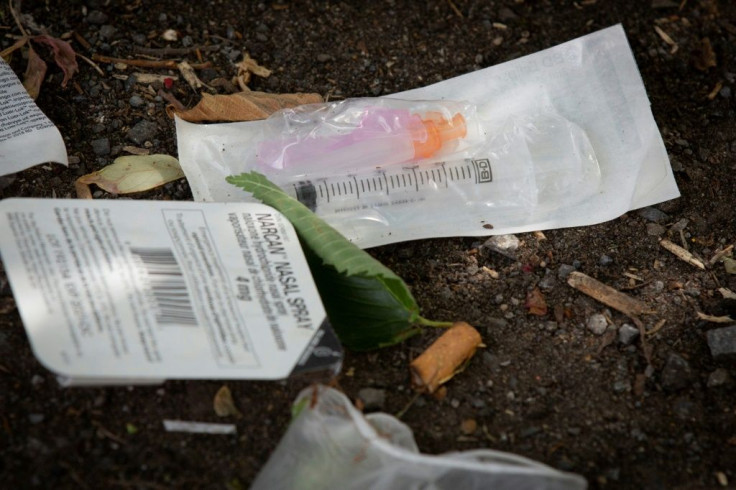Pandemic Leads To Rise In Canada Fatal Drug Overdoses
A homeless Canadian with a drug addiction, Luc Laplante has lost three friends -- Dave, Emily and Pat -- to opioid overdoses in the last three months of the coronavirus pandemic.
Partly to blame, he said, is a government emergency program that put temptation in the way of users by giving them a sudden cash infusion with few questions asked.
"People have been applying for the government COVID-19 aid, using it to binge on drugs and overdosing," he said, just hours after surviving a dangerously high dose of fentanyl himself.
It left him with a painful reminder: he fell while high, suffering a bloody scrape along the right side of his face.
Addicts and outreach workers say several factors have contributed to a surge in overdoses during the pandemic: physical isolation amid lockdowns, reduced access to addiction services such as safe injection sites, and shifts in health care resources from serving addicts to treating COVID-related illnesses.
The Trudeau government introduced a monthly Can$2,000 ($1,500) emergency benefit in March to help Canadians left jobless by the pandemic, as businesses were ordered closed to slow the spread of the coronavirus.
The government simplified the application process to quickly funnel payments to Canadians in need.

Applicants are required only to answer a few questions and certify their veracity.
"With Can$2,000 in their pocket, people just went on benders," Laplante said.
"They had access to quick cash and it killed them."
The Ontario coroner estimates fatal overdoses have shot up by 25 percent in the last three months. In British Columbia, deaths increased by 40 percent over the same period last year.
"Tragically, other jurisdictions across the country are reporting similar trends," Canada's chief public health officer Theresa Tam said last month.
She pointed to "clusters of overdoses due to unknown or unusual mixes of toxic illicit substances" in several cities, including Toronto and Calgary.
Bonnie Henry, the chief public health officer in British Columbia, broke down in tears at a recent briefing while describing a record 170 overdose fatalities in May, more than the number of coronavirus deaths in the province.
"COVID-19 is not our only health crisis," Henry said.

Three safe injection sites in Ottawa's Lower Town neighborhood slashed in half the number of spaces available to drug users, in keeping with new social distancing rules.
As a result, some people have been using drugs and overdosing in the streets.
An AFP journalist observed paramedics responding to several overdoses right outside a safe injection site.
Laplante, 37, a bent cigarette dangling from his lips and with dirt wedged beneath his fingernails, said he was alone in an empty parking lot when he shot up Monday night.
He said he was looking to relieve pain in his knee, aggravated by walking around in poor footwear while lugging all his worldly possessions in a large backpack.
It was a "stronger batch of drugs" than he was used to that did him in, he insisted.
Luckily for him, a passerby spotted him lying on the ground and alerted paramedics.
"They got me back on my feet and sent me on my way. I rested up and did more drugs," he said.
Anne Marie Hopkins of Ottawa Inner City Health said some of her clients had used payments to rent hotel rooms and died of an overdose -- alone.
"It's very sad, and devastating for everyone involved," she told AFP.
"We were already dealing with a lot, with the opioid crisis, but we were making headway. And then the pandemic hit and it made things worse," she said.
A University of British Columbia study released Thursday found that a disproportionately high number of Canadians with mental health issues (59 percent versus 33 percent) had experienced a decline in their emotional, psychological and social well-being during the pandemic. Many have ended up homeless and addicted.
"People who were already experiencing mental health challenges and... marginalization appear to be the hardest hit," researcher Emily Jenkins said in a statement.
Hopkins said she fears people with drug addictions could suffer "severe withdrawal effects" when the government funds run out.
Too, some who had used the money for better housing could be back on the streets.
And if people are found to have wrongly tapped into the emergency benefit, the government might claw it back from future financial aid, she said.
"It's a frightening time for a lot of people already suffering from trauma in their lives," she said.
© Copyright AFP 2024. All rights reserved.





















